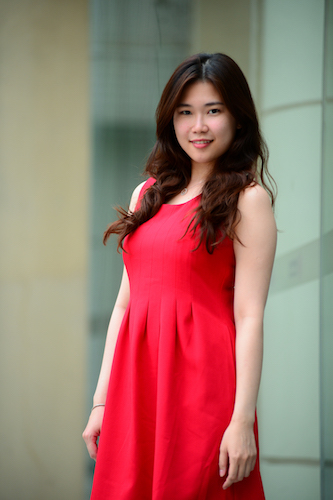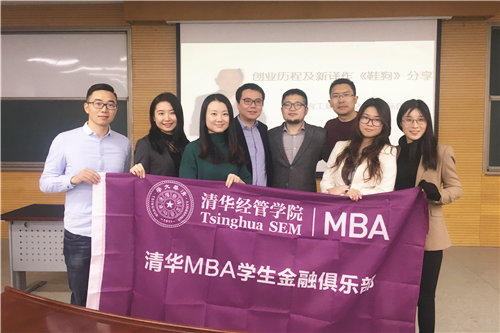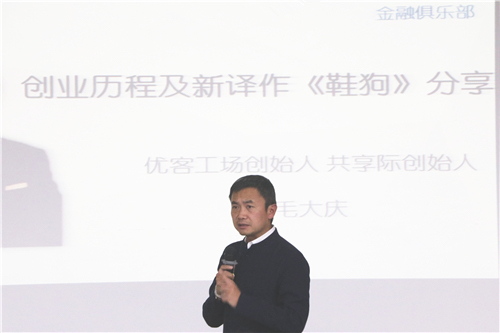Adeline Goh, GMBA Class of 2018

On December 20,
2016, along with 80 students, the Tsinghua MBA Student Finance Club welcomed a
special guest – Mr. Daqing Mao. Since joining China Vanke in 2009, he has made
significant contributions to the company, leading the company to become the
market leader in Beijing, and held positions such as Vice President of Vanke as
well as CEO of the Vanke Beijing office. He resigned in April 2015, turning to
entrepreneurship with his first venture – URWork. URWork now covers 16 cities
in China, with 36 locations, and has completed over 20 projects, with some
early projects already seeing profitability. After several funding rounds, the
company is now valued at nearly RMB 5.5 billion, and Mr. Mao has proved himself
to have successfully transformed from a professional manager into an
entrepreneur. It seemed natural, then, for the Student Finance Club to invite
him to share his thoughts on his newly translated work, Shoe Dog, as well as his entrepreneurial journey.
After a brief
introduction, Mr. Mao started to explain his affinity with the book. Describing
himself as a “half-professional translator,” he chose Phil Knight’s Shoe Dog not only because it was
recommended by Bill Gates or because it has ranked second among the world’s
best-sellers, but also because it touches the hearts of entrepreneurs. The
author, Phil Knight, is one of Nike’s founders. During the process of creating
and building the Nike brand, there was never a day when he was not concerned
with cash flow problems, getting sued, or getting fined. Even after stabilizing
the business, he received news that his eldest son met with an accident in El
Salvador. The details written in the book aptly characterize the mental,
physical, and emotional dilemmas of an entrepreneur. He even touched on the tax
evasion and industrial espionage rumors about Nike, which Mr. Mao felt was a
true depiction of honesty, integrity, and confidence about Nike’s greatness.
Mr. Mao recommended the book to students who attended the session, because the
emotions and ideas conveyed are exactly what entrepreneurs are themselves often
trying to convey.


Mr. Daqing Mao, seasoned entrepreneur and translation
enthusiast, shares insights from his years of experience (top) and poses with
the MBA Student Finance Club (bottom).
After the
book-sharing session, we moved on to a Q&A segment. Some students asked
which parts of the book moved him the most when he was doing the translation.
He answered that he could relate to the author when he described the moment of
loss after a partnership terminated, and he also felt the pain of loss when the
author described the loss of his son in a foreign land. From these two
instances, we are reminded how hard the path of entrepreneurship can be, as it
requires us to constantly reflect upon ourselves and on our lives.
Other students
also questioned the difference between China’s and Western countries’
entrepreneurial spirit, to which Mr. Mao responded by suggesting that China has
a very strong spirit of innovation and entrepreneurship. There have been many
creations by Chinese that have made us proud throughout history, and since we
have entered the technology era, we should leverage it in a way befitting of
much of our innovative history. However, Mr. Mao feels that the motivation
behind innovation should not primarily lie in profits, but rather in changing
the world – food for thought for many of us as we pursue our own innovative
paths and visions.